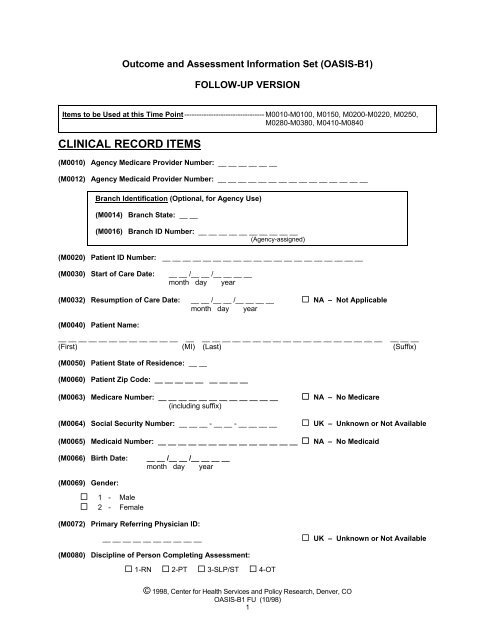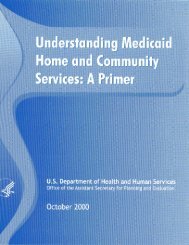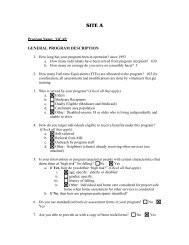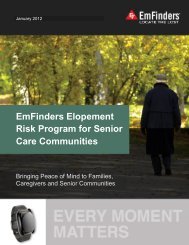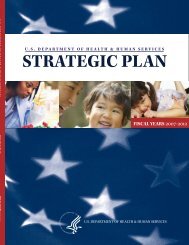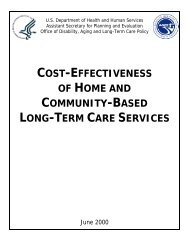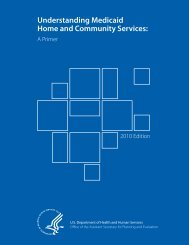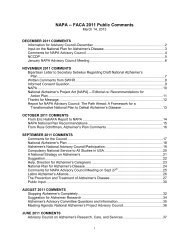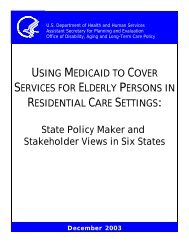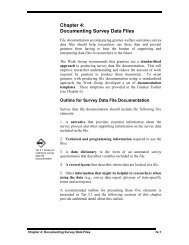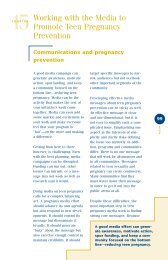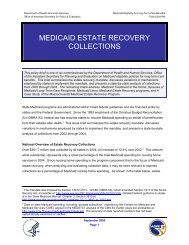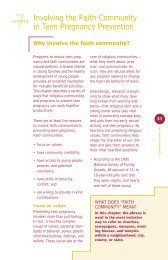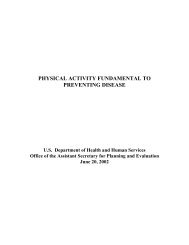OASIS-B1 - ASPE
OASIS-B1 - ASPE
OASIS-B1 - ASPE
Create successful ePaper yourself
Turn your PDF publications into a flip-book with our unique Google optimized e-Paper software.
RESPIRATORY STATUS(M0490) When is the patient dyspneic or noticeably Short of Breath? 0 - Never, patient is not short of breath 1 - When walking more than 20 feet, climbing stairs 2 - With moderate exertion (e.g., while dressing, using commode or bedpan, walking distances lessthan 20 feet) 3 - With minimal exertion (e.g., while eating, talking, or performing other ADLs) or with agitation 4 - At rest (during day or night)(M0500) Respiratory Treatments utilized at home: (Mark all that apply.) 1 - Oxygen (intermittent or continuous) 2 - Ventilator (continually or at night) 3 - Continuous positive airway pressure 4 - None of the aboveELIMINATION STATUS(M0510) Has this patient been treated for a Urinary Tract Infection in the past 14 days? 0 - No 1 - Yes NA - Patient on prophylactic treatment(M0520) Urinary Incontinence or Urinary Catheter Presence: 0 - No incontinence or catheter (includes anuria or ostomy for urinary drainage) [ If No, go to M0540 ] 1 - Patient is incontinent 2 - Patient requires a urinary catheter (i.e., external, indwelling, intermittent, suprapubic) [ Go toM0540 ](M0530) When does Urinary Incontinence occur? 0 - Timed-voiding defers incontinence 1 - During the night only 2 - During the day and night(M0540) Bowel Incontinence Frequency: 0 - Very rarely or never has bowel incontinence 1 - Less than once weekly 2 - One to three times weekly 3 - Four to six times weekly 4 - On a daily basis 5 - More often than once daily NA - Patient has ostomy for bowel elimination(M0550) Ostomy for Bowel Elimination: Does this patient have an ostomy for bowel elimination that (within thelast 14 days) necessitated a change in medical or treatment regimen? 0 - Patient does not have an ostomy for bowel elimination. 1 - Patient's ostomy did not necessitate change in medical or treatment regimen. 2 - The ostomy did necessitate change in medical or treatment regimen.© 1998, Center for Health Services and Policy Research, Denver, CO<strong>OASIS</strong>-<strong>B1</strong> FU (10/98)8
NEURO/EMOTIONAL/BEHAVIORAL STATUS(M0560) Cognitive Functioning: (Patient's current level of alertness, orientation, comprehension, concentration,and immediate memory for simple commands.) 0 - Alert/oriented, able to focus and shift attention, comprehends and recalls task directionsindependently. 1 - Requires prompting (cuing, repetition, reminders) only under stressful or unfamiliar conditions. 2 - Requires assistance and some direction in specific situations (e.g., on all tasks involving shifting ofattention), or consistently requires low stimulus environment due to distractibility. 3 - Requires considerable assistance in routine situations. Is not alert and oriented or is unable toshift attention and recall directions more than half the time. 4 - Totally dependent due to disturbances such as constant disorientation, coma, persistentvegetative state, or delirium.(M0570) When Confused (Reported or Observed): 0 - Never 1 - In new or complex situations only 2 - On awakening or at night only 3 - During the day and evening, but not constantly 4 - Constantly NA - Patient nonresponsive(M0580) When Anxious (Reported or Observed): 0 - None of the time 1 - Less often than daily 2 - Daily, but not constantly 3 - All of the time NA - Patient nonresponsive(M0590) Depressive Feelings Reported or Observed in Patient: (Mark all that apply.) 1 - Depressed mood (e.g., feeling sad, tearful) 2 - Sense of failure or self reproach 3 - Hopelessness 4 - Recurrent thoughts of death 5 - Thoughts of suicide 6 - None of the above feelings observed or reported(M0600) Patient Behaviors (Reported or Observed): (Mark all that apply.) 1 - Indecisiveness, lack of concentration 2 - Diminished interest in most activities 3 - Sleep disturbances 4 - Recent change in appetite or weight 5 - Agitation 6 - A suicide attempt 7 - None of the above behaviors observed or reported© 1998, Center for Health Services and Policy Research, Denver, CO<strong>OASIS</strong>-<strong>B1</strong> FU (10/98)9
(M0670) Bathing: Ability to wash entire body. Excludes grooming (washing face and hands only). 0 - Able to bathe self in shower or tub independently. 1 - With the use of devices, is able to bathe self in shower or tub independently. 2 - Able to bathe in shower or tub with the assistance of another person:(a) for intermittent supervision or encouragement or reminders, OR(b) to get in and out of the shower or tub, OR(c) for washing difficult to reach areas. 3 - Participates in bathing self in shower or tub, but requires presence of another person throughoutthe bath for assistance or supervision. 4 - Unable to use the shower or tub and is bathed in bed or bedside chair. 5 - Unable to effectively participate in bathing and is totally bathed by another person.(M0680) Toileting: Ability to get to and from the toilet or bedside commode. 0 - Able to get to and from the toilet independently with or without a device. 1 - When reminded, assisted, or supervised by another person, able to get to and from the toilet. 2 - Unable to get to and from the toilet but is able to use a bedside commode (with or withoutassistance). 3 - Unable to get to and from the toilet or bedside commode but is able to use a bedpan/urinalindependently. 4 - Is totally dependent in toileting.(M0690) Transferring: Ability to move from bed to chair, on and off toilet or commode, into and out of tub orshower, and ability to turn and position self in bed if patient is bedfast. 0 - Able to independently transfer. 1 - Transfers with minimal human assistance or with use of an assistive device. 2 - Unable to transfer self but is able to bear weight and pivot during the transfer process. 3 - Unable to transfer self and is unable to bear weight or pivot when transferred by another person. 4 - Bedfast, unable to transfer but is able to turn and position self in bed. 5 - Bedfast, unable to transfer and is unable to turn and position self.(M0700) Ambulation/Locomotion: Ability to SAFELY walk, once in a standing position, or use a wheelchair, oncein a seated position, on a variety of surfaces. 0 - Able to independently walk on even and uneven surfaces and climb stairs with or without railings(i.e., needs no human assistance or assistive device). 1 - Requires use of a device (e.g., cane, walker) to walk alone or requires human supervision orassistance to negotiate stairs or steps or uneven surfaces. 2 - Able to walk only with the supervision or assistance of another person at all times. 3 - Chairfast, unable to ambulate but is able to wheel self independently. 4 - Chairfast, unable to ambulate and is unable to wheel self. 5 - Bedfast, unable to ambulate or be up in a chair.(M0710) Feeding or Eating: Ability to feed self meals and snacks. Note: This refers only to the process ofeating, chewing, and swallowing, not preparing the food to be eaten. 0 - Able to independently feed self. 1 - Able to feed self independently but requires:(a) meal set-up; OR(b) intermittent assistance or supervision from another person; OR(c) a liquid, pureed or ground meat diet. 2 - Unable to feed self and must be assisted or supervised throughout the meal/snack. 3 - Able to take in nutrients orally and receives supplemental nutrients through a nasogastric tube orgastrostomy. 4 - Unable to take in nutrients orally and is fed nutrients through a nasogastric tube or gastrostomy. 5 - Unable to take in nutrients orally or by tube feeding.© 1998, Center for Health Services and Policy Research, Denver, CO<strong>OASIS</strong>-<strong>B1</strong> FU (10/98)11
(M0720) Planning and Preparing Light Meals (e.g., cereal, sandwich) or reheat delivered meals: 0 - (a) Able to independently plan and prepare all light meals for self or reheat delivered meals; OR(b) Is physically, cognitively, and mentally able to prepare light meals on a regular basis but hasnot routinely performed light meal preparation in the past (i.e., prior to this home careadmission). 1 - Unable to prepare light meals on a regular basis due to physical, cognitive, or mental limitations. 2 - Unable to prepare any light meals or reheat any delivered meals.(M0730) Transportation: Physical and mental ability to safely use a car, taxi, or public transportation (bus, train,subway). 0 - Able to independently drive a regular or adapted car; OR uses a regular or handicap-accessiblepublic bus. 1 - Able to ride in a car only when driven by another person; OR able to use a bus or handicap vanonly when assisted or accompanied by another person. 2 - Unable to ride in a car, taxi, bus, or van, and requires transportation by ambulance.(M0740) Laundry: Ability to do own laundry -- to carry laundry to and from washing machine, to use washer anddryer, to wash small items by hand. 0 - (a) Able to independently take care of all laundry tasks; OR(b) Physically, cognitively, and mentally able to do laundry and access facilities, but has notroutinely performed laundry tasks in the past (i.e., prior to this home care admission). 1 - Able to do only light laundry, such as minor hand wash or light washer loads. Due to physical,cognitive, or mental limitations, needs assistance with heavy laundry such as carrying large loadsof laundry. 2 - Unable to do any laundry due to physical limitation or needs continual supervision and assistancedue to cognitive or mental limitation.(M0750) Housekeeping: Ability to safely and effectively perform light housekeeping and heavier cleaning tasks. 0 - (a) Able to independently perform all housekeeping tasks; OR(b) Physically, cognitively, and mentally able to perform all housekeeping tasks but has notroutinely participated in housekeeping tasks in the past (i.e., prior to this home careadmission). 1 - Able to perform only light housekeeping (e.g., dusting, wiping kitchen counters) tasksindependently. 2 - Able to perform housekeeping tasks with intermittent assistance or supervision from anotherperson. 3 - Unable to consistently perform any housekeeping tasks unless assisted by another personthroughout the process. 4 - Unable to effectively participate in any housekeeping tasks.(M0760) Shopping: Ability to plan for, select, and purchase items in a store and to carry them home or arrangedelivery. 0 - (a) Able to plan for shopping needs and independently perform shopping tasks, including carryingpackages; OR(b) Physically, cognitively, and mentally able to take care of shopping, but has not done shoppingin the past (i.e., prior to this home care admission). 1 - Able to go shopping, but needs some assistance:(a) By self is able to do only light shopping and carry small packages, but needs someone to dooccasional major shopping; OR(b) Unable to go shopping alone, but can go with someone to assist. 2 - Unable to go shopping, but is able to identify items needed, place orders, and arrange homedelivery. 3 - Needs someone to do all shopping and errands.© 1998, Center for Health Services and Policy Research, Denver, CO<strong>OASIS</strong>-<strong>B1</strong> FU (10/98)12
(M0770) Ability to Use Telephone: Ability to answer the phone, dial numbers, and effectively use the telephone tocommunicate. 0 - Able to dial numbers and answer calls appropriately and as desired. 1 - Able to use a specially adapted telephone (i.e., large numbers on the dial, teletype phone for thedeaf) and call essential numbers. 2 - Able to answer the telephone and carry on a normal conversation but has difficulty with placingcalls. 3 - Able to answer the telephone only some of the time or is able to carry on only a limitedconversation. 4 - Unable to answer the telephone at all but can listen if assisted with equipment. 5 - Totally unable to use the telephone. NA - Patient does not have a telephone.MEDICATIONS(M0780) Management of Oral Medications: Patient's ability to prepare and take all prescribed oral medicationsreliably and safely, including administration of the correct dosage at the appropriate times/intervals.Excludes injectable and IV medications. (NOTE: This refers to ability, not compliance orwillingness.) 0 - Able to independently take the correct oral medication(s) and proper dosage(s) at the correcttimes. 1 - Able to take medication(s) at the correct times if:(a) individual dosages are prepared in advance by another person; OR(b) given daily reminders; OR(c) someone develops a drug diary or chart. 2 - Unable to take medication unless administered by someone else. NA - No oral medications prescribed.(M0790) Management of Inhalant/Mist Medications: Patient's ability to prepare and take all prescribedinhalant/mist medications (nebulizers, metered dose devices) reliably and safely, including administration ofthe correct dosage at the appropriate times/intervals. Excludes all other forms of medication (oraltablets, injectable and IV medications). 0 - Able to independently take the correct medication and proper dosage at the correct times. 1 - Able to take medication at the correct times if:(a) individual dosages are prepared in advance by another person, OR(b) given daily reminders. 2 - Unable to take medication unless administered by someone else. NA - No inhalant/mist medications prescribed.(M0800) Management of Injectable Medications: Patient's ability to prepare and take all prescribed injectablemedications reliably and safely, including administration of correct dosage at the appropriatetimes/intervals. Excludes IV medications. 0 - Able to independently take the correct medication and proper dosage at the correct times. 1 - Able to take injectable medication at correct times if:(a) individual syringes are prepared in advance by another person, OR(b) given daily reminders. 2 - Unable to take injectable medications unless administered by someone else. NA - No injectable medications prescribed.© 1998, Center for Health Services and Policy Research, Denver, CO<strong>OASIS</strong>-<strong>B1</strong> FU (10/98)13
EQUIPMENT MANAGEMENT(M0810) Patient Management of Equipment (includes ONLY oxygen, IV/infusion therapy, enteral/parenteralnutrition equipment or supplies): Patient's ability to set up, monitor and change equipment reliably andsafely, add appropriate fluids or medication, clean/store/dispose of equipment or supplies using propertechnique. (NOTE: This refers to ability, not compliance or willingness.) 0 - Patient manages all tasks related to equipment completely independently. 1 - If someone else sets up equipment (i.e., fills portable oxygen tank, provides patient with preparedsolutions), patient is able to manage all other aspects of equipment. 2 - Patient requires considerable assistance from another person to manage equipment, butindependently completes portions of the task. 3 - Patient is only able to monitor equipment (e.g., liter flow, fluid in bag) and must call someone elseto manage the equipment. 4 - Patient is completely dependent on someone else to manage all equipment. NA - No equipment of this type used in care [ If NA, go to M0830 ](M0820) Caregiver Management of Equipment (includes ONLY oxygen, IV/infusion equipment,enteral/parenteral nutrition, ventilator therapy equipment or supplies): Caregiver's ability to set up,monitor, and change equipment reliably and safely, add appropriate fluids or medication,clean/store/dispose of equipment or supplies using proper technique. (NOTE: This refers to ability, notcompliance or willingness.) 0 - Caregiver manages all tasks related to equipment completely independently. 1 - If someone else sets up equipment, caregiver is able to manage all other aspects. 2 - Caregiver requires considerable assistance from another person to manage equipment, butindependently completes significant portions of task. 3 - Caregiver is only able to complete small portions of task (e.g., administer nebulizer treatment,clean/store/dispose of equipment or supplies). 4 - Caregiver is completely dependent on someone else to manage all equipment. NA - No caregiverEMERGENT CARE(M0830) Emergent Care: Since the last time <strong>OASIS</strong> data were collected, has the patient utilized any of thefollowing services for emergent care (other than home care agency services)? (Mark all that apply.) 0 - No emergent care services [ If no emergent care, skip M0840 ] 1 - Hospital emergency room (includes 23-hour holding) 2 - Doctor's office emergency visit/house call 3 - Outpatient department/clinic emergency (includes urgicenter sites) UK - Unknown [ If UK, skip M0840 ](M0840) Emergent Care Reason: For what reason(s) did the patient/family seek emergent care? (Mark all thatapply.) 1 - Improper medication administration, medication side effects, toxicity, anaphylaxis 2 - Nausea, dehydration, malnutrition, constipation, impaction 3 - Injury caused by fall or accident at home 4 - Respiratory problems (e.g., shortness of breath, respiratory infection, tracheobronchialobstruction) 5 - Wound infection, deteriorating wound status, new lesion/ulcer 6 - Cardiac problems (e.g., fluid overload, exacerbation of CHF, chest pain) 7 - Hypo/Hyperglycemia, diabetes out of control 8 - GI bleeding, obstruction 9 - Other than above reasons UK - Reason unknown© 1998, Center for Health Services and Policy Research, Denver, CO<strong>OASIS</strong>-<strong>B1</strong> FU (10/98)14


